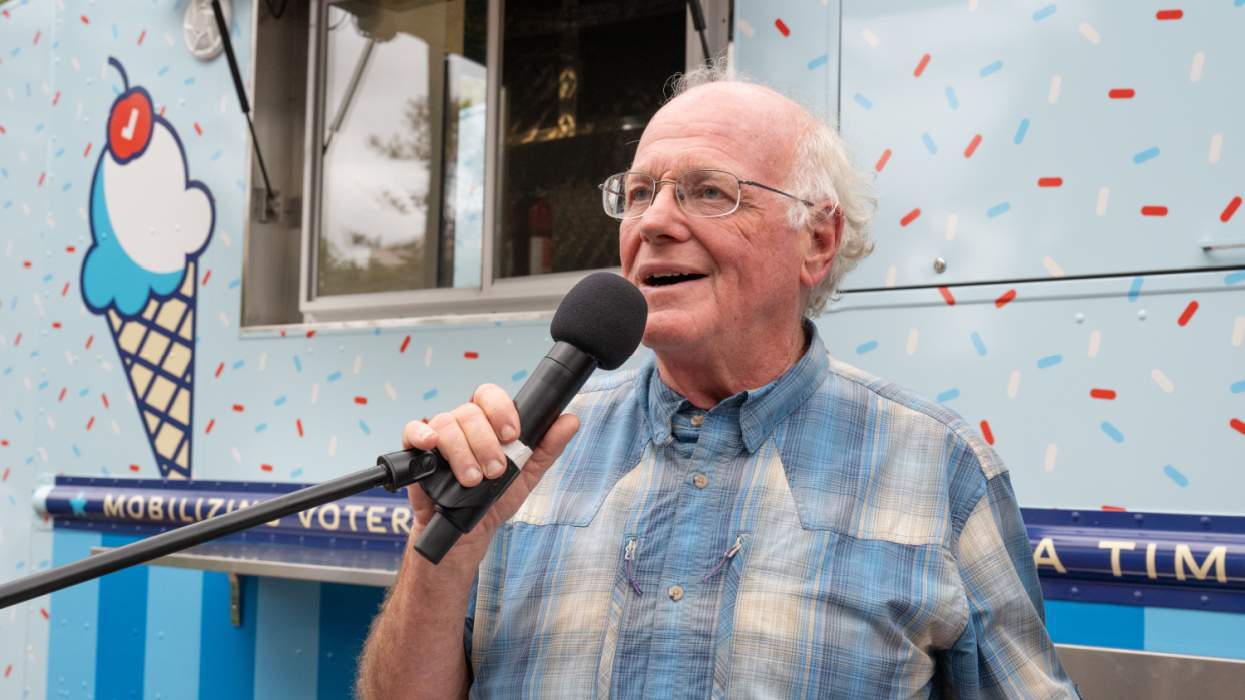In 2025, trans survival is political. Trans leadership? That’s revolutionary.
Mila Myles knows both truths intimately. She’s not just the highest-ranking out transgender communications official in any statewide executive office — she’s also one of the most senior trans political operatives in the country, period. And as communications director for Delaware Democratic Gov. Matt Meyer, Myles isn’t just helping craft the governor’s message. She is the message.
Keep up with the latest in LGBTQ+ news and politics. Sign up for The Advocate's email newsletter.
A trailblazing role
“I worry about my safety every day,” Myles said in an interview with The Advocate. “But if I let that stop me, I’d never leave my house. That’s why I took this job — because it shows we’re not afraid.”
Myles represents a new kind of political presence: not only visible and experienced but central. She is helping lead a first-term administration in a small state with an outsized national profile. Meyer, a 51-year-old attorney and former county politician, was elected in 2024 alongside Congresswoman Sarah McBride, the first out transgender person elected to Congress. Together, the three make Delaware a rare counterpoint to the national erosion of LGBTQ+ rights. While politicians on the right are using transgender people’s lives as a cultural wedge issue and stripping them of rights, the First State is doing the opposite.
Related: ‘State of Firsts’ captures the history of Sarah McBride’s rise as the first transgender member of Congress
Related: Sarah McBride on why support for trans rights ebbed — and how to build it back up
Across the country, the Trump administration and Republican legislatures have accelerated the rollback of LGBTQ+ protections: ending trans military service, restricting gender-affirming care, and, in some states, even criminalizing medical providers. In June, the U.S. Supreme Court upheld Tennessee’s ban on gender-affirming care for minors in United States v. Skrmetti, a ruling that opened the door for broader legal attacks on transgender people’s access to essential health care. And yet, in Delaware, a trans woman is at the table where crisis communications are shaped, a trans woman is representing the state in Congress, and a cis man is cheering them on.
From Indiana to influence
It wasn’t always obvious that Myles would be here.
She says she grew up in a working-class family in Indiana, a state that has passed increasingly punitive laws targeting LGBTQ+, and in particular, transgender youth. “I wanted to be a fixer,” she said. Before she came out, she enrolled at Wabash College, one of the last all-male undergraduate institutions in the country, in what she now recognizes as an attempt to force herself into a version of masculinity that never checked out. “Like other trans people who join the military or embrace hypermasculinity, I was trying to make something fit,” she said. “But it didn’t.”
After graduate school stints at the London School of Economics and the University of Southern California, Myles began her political career working on then-Attorney General Kamala Harris’s U.S. Senate campaign. Over the next eight years, she helped develop and implement organizing and communications strategies in more than 30 states. She worked in the Joe Biden administration at the U.S. Small Business Administration. She also came out as trans, transitioned while working at AFSCME International, the largest labor union representing public sector workers, and eventually took on senior roles in Democratic campaigns, including for the 2024 Indiana gubernatorial race.
Myles didn’t always feel secure being visible, let alone out front. “I wasn’t even confident I could do this as a gay person without being completely siloed,” she recalled. “Eventually, you just have to pull the trigger.”
In early 2020, she returned to California and started a new job just as the COVID-19 pandemic began to unfold. That’s also when she began her gender transition. Working at AFSCME International provided her with some stability, but she made a conscious decision to stay behind the scenes during the 2020 and 2022 election cycles. “I didn’t feel safe being front and center,” she said. “I was just beginning my transition, and I was worried—worried I wouldn’t pass, worried about discrimination.”
Related: Sarah McBride wins Delaware U.S. House seat, becoming the first out trans member of Congress
She says that changed after she underwent gender-confirmation surgery in late 2022. By early 2023, she joined the U.S. Small Business Administration and began traveling nationally with the agency’s administrator. “I was meeting with Democrats and Republicans in red states and blue states. I had to put my anxiety aside and remind myself: I’m a trans woman, yes, but I’m also a woman, a political operative, and a representative of a Cabinet member. I’ve got a job to do.” In many of those rooms, she added, she was the first trans person anyone had ever worked with.
Later, she chose to move to Delaware.
“Especially with the Trump administration coming into power and that loss of a national backstop, I knew it was incredibly important for me to move to a blue state,” she said. “And how lucky could I be to move to a state represented by the first and only trans member of Congress?”
Building a Cabinet that reflects reality
Myles applied for a job with the then-Gov.–elect Meyer’s incoming administration in Delaware. Her resume was strong. Meyer said her pitch was stronger.
“We were hiring for a transition team,” Meyer recalled. “Mila ended her interview with, ‘I don’t know how many people you’re talking to who are experienced in transitions. I’m very experienced in transitions.’ And I didn’t even get the reference at first.”
But he understood her talent.
Meyer, an attorney and former middle school math teacher, ran for governor with a platform focused on education, equity, and innovation. “When I put a team together, I’m not checking identity boxes,” he said. “I’m asking: Can you solve problems? Can you communicate? Do you reflect a diversity of perspectives?”
Myles, he said, was the answer to all three.
Under her direction, the governor’s communications strategy has helped shape messaging around Trump-era trade disruptions, public education funding, small business recovery, and health care access. But her role carries symbolic weight far beyond policy.
If the Trump administration came after him for having a trans spokesperson, what would he do?
His answer was immediate. “We don’t govern based on fear,” he said. “If I’m hiring or firing based on fear of the federal government, then what am I doing in this position?”
Delaware’s bold defiance through inclusive governance
That principle is reflected in his record. On June 21, Meyer signed Executive Order 11, which made Delaware a legal refuge for patients and providers of gender-affirming care. The order prohibits state cooperation with out-of-state investigations related to transgender people’s medical care and prevents licensing boards from penalizing providers who offer care under Delaware law. He signed it at CAMP Rehoboth, a longtime LGBTQ+ community hub, alongside members of the Delaware LGBTQ+ Commission and out lawmakers, including nonbinary state Rep. DeShanna Neal.
At the signing, Meyer told the crowd he was there for three reasons: to build an inclusive economy, to keep government out of private medical decisions, and to stand on the side of hope over hate. “Here in Delaware, we believe in freedom for everyone without exception,” he said.
Meyer criticized politicians who villainize transgender people to gain attention and pledged to resist that trend with empathy and policy. “I’ve got to be honest, I don’t completely understand what’s going on every day between your ears,” Meyer said. “Quite frankly, you probably don’t understand what’s going on every day between my ears. But we’re going to work to understand each other. We’re going to work to tolerate each other. We’re going to work to make sure everybody here has access to the highest quality health care, without exception.”
Meyer also told The Advocate that allyship and showing Pride is more than a brief display of support in the state.
“Pride Month doesn’t end on June 30 in Delaware — it’s a year-round commitment,” Meyer said. “We celebrate from January 1 to December 31.” He urged LGBTQ+ people feeling isolated or targeted elsewhere to find community and safety in Delaware. “If you’re feeling hate and feeling excluded wherever you are, you really gotta make your way to Rehoboth,” he said. “And if the traffic is too hard, you should come to Delaware.”
Visibility, vulnerability, and the power of presence
Acknowledging the difficulty of being transgender in conservative parts of the country, Meyer described meeting a young trans woman from a rural Delaware town “where there are MAGA hats and MAGA Trump signs pretty much everywhere.” He said, “It’s hard for me to put myself in her shoes and imagine what she goes through every day. All I can do is provide a support system and tell her to stand strong.”
That’s exactly the support system Myles came looking for—and is now helping lead.
“Delaware is different,” she said. “We have an overrepresentation of LGBTQ+ people in government and an undercurrent of lived experience that guides how policy gets made.”
That includes McBride, who called Myles a “trailblazer.”
“Mila is a talented communications professional who brings a wealth of experience and insight to Gov Meyer’s administration,” McBride told The Advocate in a statement. “With so much confusion and chaos coming from the federal administration, Mila has hit the ground running to ensure clarity and transparency from our state government.”
Related: Sarah McBride is 'mystified' that Republicans are making trans people a 'priority'
It’s not lost on Myles that she may be the only openly trans communications director for a sitting U.S. governor. She’s also aware that many Americans have never knowingly worked with a trans colleague, much less answered to one in a senior government role.
“Even now, I know I’m the first trans person a lot of people have worked with,” she said. “But I’ve made a choice to be open. I want to be a resource — because someone asking a question in good faith is someone trying to understand.”
Her openness is strategic. But it’s also dangerous. In red states, trans officials and school employees have been targeted with doxxing, threats, and even criminal investigations. Myles maintains a low public profile. But she insists on professional visibility.
To youth outside Delaware who may live in more hostile areas, Meyer has a message to: “If you’re sitting in Indiana or Arkansas, and you feel like this country doesn’t want you to get true health care or be true to yourself — just know there are leaders who love you, who care about you, and who want you to thrive in your true self.”
Myles doesn’t call herself a trailblazer. But her presence in the room — any room — shifts what’s possible.
“Her service is a reminder that in our state of neighbors, our diversity is our strength and that we are better off when we tap the creativity and commitment of people regardless of identity,” McBride said. “Mila is a trailblazer, and I can’t wait to see all that she continues to do.”
Myles accepts the challenge. “It’s probably going to get worse before it gets better,” Myles said. “That’s exactly why it’s so important to have people like me, and people like Sarah, in public leadership—especially during the Trump administration. We’re living proof that, yes, you can be yourself. It is possible.”
She added, “We’re not saying it’s easy, but it’s possible.”
Related: New poll shows who currently leads potential 2028 Democratic presidential field
















Charlie Kirk DID say stoning gay people was the 'perfect law' — and these other heinous quotes
These are some of his worst comments about LGBTQ+ people made by Charlie Kirk.